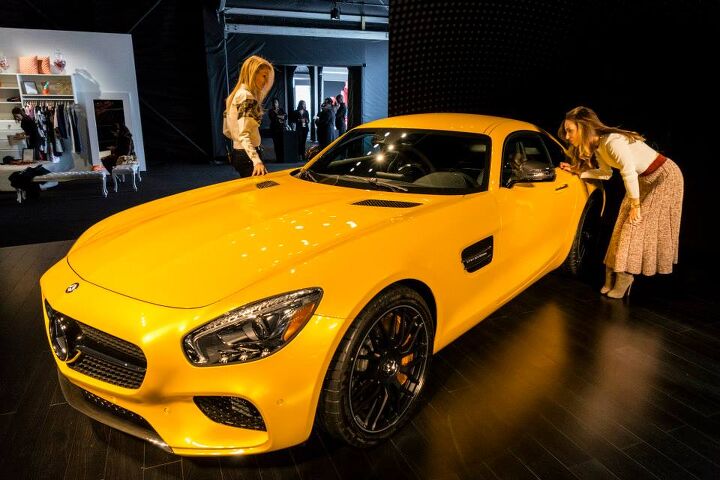#Surveys
AAA Study Finds Infotainment Systems Dangerously Distracting
Automobiles are more tech-laden than ever and, according to a recent study, those interactive bells and whistles contribute heavily to distracted driving.
With connected cars ready to shoot off assembly lines and into driveways at an accelerated pace, the danger of someone flicking through their dashboard menus when they should be looking at the road is only going to grow. Many states prohibit phone usage while driving, yet there is no law against setting your radio pre-tunes or customizing your digital dashboard while hurtling down the expressway — not that there necessarily should be.
However, the American Automobile Association’s Foundation for Traffic Safety commissioned researchers from the University of Utah to examine the physical and mental demand required to complete various tasks using the infotainment systems in 30 new 2017 vehicles. The conclusion was that the growing cavalcade of buttons, screens, and technology does an incredibly good job at keeping you from minding the road ahead.
Autonomous Cars Make People Uncomfortable - What Can Manufacturers Do About It?
There’s nothing that will convince me that the first wave of autonomous taxis will be anything other than mobile biohazards, providing a slightly less convenient solution to paying a man to let you ride in the back of his Toyota Camry for a few miles. However, I will give them a shot once they arrive — mainly out of curiosity, which puts me in the minority.
Gartner Inc., an American research and advisory firm that works specifically within the realm of advanced technologies, recently completed a survey where over half of its respondents said there was no way in hell they’d get into the back of a fully autonomous vehicle. Its findings echo an American-based MIT study from earlier this year, as well as a global survey from Deloitte. The consensus: most of the population doesn’t feel particularly good about self-driving cars.
Not to be a defender of unproven technology, but there’s also nothing stopping a human cab driver from driving you to the wrong destination before trying to murder you with an axe. It doesn’t happen often, but it is a possibility. Likewise, autonomous cabs pose some element of risk no matter how good a job manufacturers do with those early models. But you’re not likely to be the occupant of the one that does goes haywire. It’s a problem of perception more than anything else.
Nobody Cares About or Uses the Premium Technology in High-end Luxury Cars
Fifty years ago the equipment disparity between luxury vehicles and economy cars was vast, but things are different today. With the exception of nicer materials and cutting-edge technology, you can get essentially everything you would want in a basic hatchback. We’re not talking about power windows and air conditioning either; the technological trickle-down now includes things like active safety systems, heated seats, in-car navigation, multiple driving modes, and more.
As it turns out, the great unwashed masses of today enjoy their pleb-mobiles at about the same level as affluent individuals like their own diamond-encrusted executive mobility suites. The reason? Because nobody cares about premium features they can’t figure out how to use, nor do they miss technology that isn’t part of their daily routine.
American Car Buyers Less Satisfied With Domestics, Toyota Perpetually Fine: Study
Overall contentment among domestic vehicle owners dropped slightly in this year’s American Customer Satisfaction Index. Meanwhile, enjoyment from European and Asian automakers stayed roughly the same. However, that information might not be quite so useful until you begin comparing individual brands (and even other industries).
Domestic automakers averaged 80 out of a possible 100 points in the ACSI scale, with General Motors as the only American manufacturer seeing an improvement from 2016. For the sake of comparison, let’s see how other industries are doing on either end of the spectrum: Cable companies, which everyone hates, averaged 64 points and television sets, which everyone loves, scored 87 points.
By and large, that doesn’t place automakers in the doghouse. But it does highlight a modest shift in the perception of specific domestic brands while longtime satisfaction leaders, like Toyota and Lexus, hold pole position.
When It Comes to Paint Preferences, Men and Women Aren't Equal: Study
While local climate plays a role, prefered automotive paint schemes largely come down to personal feelings and dealer inventory. There is also the matter of what colors are trending within the industry and, according to a recent consumer survey tabulation from iSeeCars.com, gender.
The automotive data research company compiled survey results from over 700,000 consumers and close to 30 million used car sales between 2015 and 2016 to find gender biases for specific colors. For the most part, color preferences are irrelevant. But there are a few standout shades that one group seems to prefer over the other.
The Hunt for Parking Apparently Costs Americans $73 Billion Annually
INRIX Research, which compiles automotive data for automakers and state agencies, is claiming Americans waste 73 billion dollars every year trying to find and hold a parking space. Following a survey of nearly 6,000 drivers in 10 U.S. cities, INRIX concluded the average driver suffers an average of 17 hours and $345 worth of wasted time, fuel, and emissions.
While that sounds ridiculous, a 2017 national survey from the United Kingdom’s Department of Transport claimed average British drivers waste four days of their lives every year doing the same thing. The number was twice as high for city-based residents. Perhaps 17 annual hours is a little more reasonable than it initially seemed.
Study Shows Nearly Nine in 10 Americans Want Better Fuel Economy, But There's a Problem
A recent study from Consumers Union — the public policy and advocacy division of Consumer Reports — shows continued interest among U.S. residents in seeing automakers improve fuel economy figures, even as gas prices remain fairly low.
While this should come as a shock to no one, nearly nine in 10 surveyed consumers agreed automakers should continue improving fuel efficiency standards on all vehicles. As well, only 30 percent believed manufacturers actually cared about lowering fuel costs for their customers.
This might be true but, then again, why would automakers do such a thing when the general populace has essentially turned its back on economical passenger cars? With little incentive to sell them, especially if the Trump administration alters 2025 emission targets, any top-tier automaker focusing exclusively on building MPG-focused automobiles would be placing itself at major financial risk.
The survey indicated fuel economy as the area perceived to possess the most room for improvement in modern vehicles. However, consumers have not used their wallets to bolster economy car sales. There appears to be a disparity between what the public claims to value and how it actually behaves. At a minimum, consumers may have misunderstood everything it would take to see fleet-wide fuel consumption decline. If they want to see higher MPGs, they’re going to have to make some sacrifices and the survey doesn’t allude to that fact.
Shaping a Bleaker Future: Generational Trends in New Car Ownership
There has been plenty of doomsday prophecies surrounding the automotive industry in the last year, based largely upon the assumption that younger drivers are less willing to support it or simply cannot afford to. Stupid, right? Not really. While the direness of the situation is often exaggerated, plenty of evidence exists to underscore the impending troubles of the new car market. Whether it’s because those in their salad days don’t care as much about cars as their elders or simply have less disposable income (hint: it’s the second one), real change is coming for OEMs.
Younger shoppers are noticeably more likely to purchase used vehicles than their more venerable contemporaries are, but “young” is a relative term — especially in this instance. According to a recent study, 53.7 percent of prospective buyers under forty plan on getting a used car the next time they need wheels. For those over forty, that number is 49.7 percent. As you’d expect older people to buy more new cars, this much of a disparity at mid-life is significant.
J.D. Power Showers Buick and Lexus With Praise Over Service Satisfaction
J.D. Power and Associates continued its courtship of Buick and Lexus in its latest scorecard for consumer satisfaction with dealer service departments. While J.D. passes out awards around like a teacher giving PARTICIPANT ribbons at an elementary school science fair, its consumer index is a decent way to track automotive trends. In this instance, that trend is continued improvement of American manufacturers. Well, most of them.
Fiat Chrysler should sincerely consider making a large contribution to J.D. Power so it can get out of last place in literally every single category.
Meanwhile, General Motors is on its best behavior with a score of 807 out of 1,000, an improvement over last year by a full 10 points thanks to Buick taking top honors (860 points) and its other brands scoring substantially above the industry average. Buick was followed by Mini, GMC, Chevrolet and Nissan in the mass-market brand rankings.
The Average American is Seriously Afraid of Autonomous Cars: Study
There is something uncanny about a car that can drive itself. If you transplanted the world’s first motorists into a modern autonomous vehicle and let it lose on a track, they’d probably surmise witchcraft as the only plausible explanation and jump out in terror. Humans are innately distrustful of anything unfamiliar — it’s an important part of our survival strategy as a species. With that in mind, it isn’t surprising to hear that many Americans are a little wary of self-driving cars.
However, a recent study from the American Automobile Association suggests it might be more serious than that. The vast majority of surveyed Americans admitted to being “afraid” of riding in an autonomous vehicle while over half said they felt less safe at the prospect of sharing the road with driverless technology. This isn’t likely to be welcome news for automakers, considering that every major manufacturer is currently investing heavily into the computer and industrial sciences required to make autonomous tech possible.
Gen Xers, Millennials Struggle to Find Trusted Mechanics
Everyone knows a friend or, more frequently, a friend’s middle-aged dad who has “a guy.”
The guy in question doesn’t necessarily need to be male and the friend only needs to know them tangentially. They just have to be some kind of professional or tradesman that they trust implicitly with a single important aspect of their life. For automotive enthusiasts, the guy is a mechanic and usually has a whole shop backing him up. Unfortunately, “the guy” has remained elusive for younger generations.
Shocker: Study Shows Americans Aren't Interested in Owning EVs, Prefer Better Gas Mileage Instead
The electric vehicle revolution, if you want to call it that, won’t happen in the “I woke up and everything was different” manner envisioned by hard-core EV enthusiasts.
EVs are no longer new to the automotive scene, but there’s still a vast gulf between the opinions of politicians and automakers and that of the buying public. Not surprisingly, the vast majority of Americans polled in a recent study say they aren’t ready or willing to add an electric vehicle to their household.
Study: Nine Out Of 10 Millennials Consider Car Ownership Important
Allegedly, Millennials care only about the latest iPhone, and not the i8. Nine out of 10 Millennials would disagree, and consider car ownership important.
Support For Automated Enforcement Only So-So Among Americans
While use of red-light and speed cameras are on the wane, support for automated enforcement depends upon where and who the constituent is.
Lexus Takes Gold In 2015 JD Power Dependability Study
For the fourth consecutive year, Lexus is tops among the brands ranked in JD Power’s annual Vehicle Dependability Study.






























Recent Comments